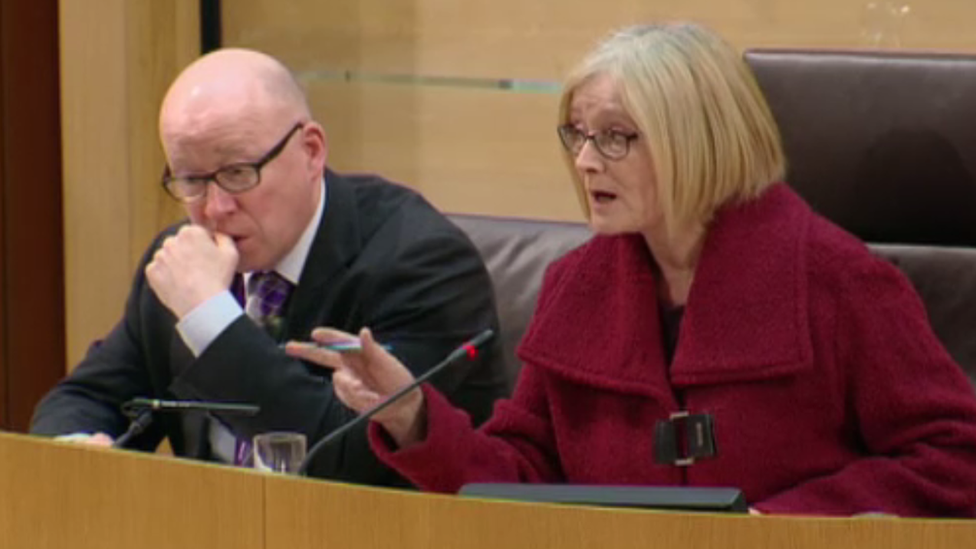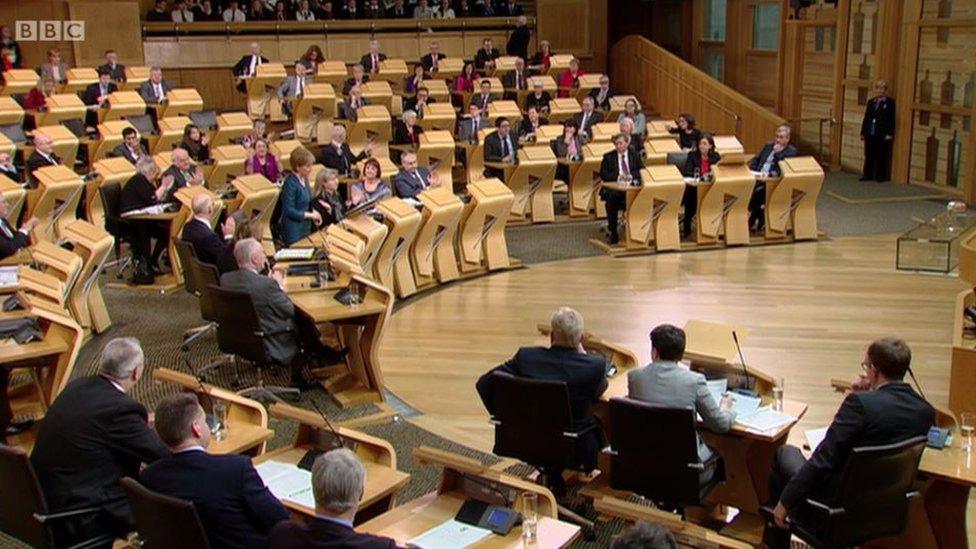Stramash over the 'L-word' at Holyrood
- Published
Nicola Sturgeon was heckled and called a "liar" during first minister's questions
Parliamentary discourse differs from street speech. It is more mannered, more studied. Such is the case even at Holyrood where the Westminster linguistic traditions - Right Honourable, the Other Place etc - are set aside.
But, still, most phrasing is permissible. Personally, a little light of joy enters my otherwise stern soul when I hear a Scots word deployed. I long to hear an MSP regret that a particular debate has descended into a clanjamfrie.
It takes me back to the days when I was the semi-official expert on the Scots tongue for the Hansard reporters in the Commons. When Donald Dewar got to his feet, they would frequently cast a knowing glance my way, suggesting my translation services would soon be required.
However, even within that broad ambit, some words are best excluded. I would, for example, frown upon an elected member who sought to debate antidisestablishmentarianism.
More to the point, some words are, in effect, prohibited. Such is the case with that fine noun, "liar". MSPs do not call each other Honourable (or Gallant, Learned and the rest). But they still seek comfort in the attendant sentiment.
They generally dislike any suggestion that there might be a conflagration in the region of their bahookie clothing.
During decidedly robust exchanges between the first minister and Labour's Kezia Dugdale, the non-word could be plainly heard. Apparently, it transpired, from a non-person.
Nicola Sturgeon was expanding upon her theme that Labour intended to impose an income tax increase upon everyone earning more than £11,000.

"Liar" is not a word considered acceptable in the parliamentary chamber
She said exactly the same thing last week - without an instant rebuttal from Labour or recourse to non-parliamentary language.
But this week was different. A shout of "liar" could plainly be heard in the chamber - and across the nation via the telly.
Presumably the word was deployed on the basis that Labour intends to introduce a rebate for the lowest earners, administered via local authorities. Scottish ministers say said rebate would be unworkable or illegal or both. Labour dissent.
But no matter for now. The immediate issue in the chamber was THAT word. Sundry SNP backbenchers - and indeed Ministers - responded. "He said 'liar'," they told each other, Labour and the presiding officer, although not necessarily in that order.
Fingers were pointed, suggesting a Labour culprit. The fine scribes in Official Report later sought clarification. Apparently, stout denial ensued.
The president officer, Tricia Marwick, said she had not heard the word itself. (Selective deafness can occasionally be a blessing in the chair.) But she had incontestably heard the repeated accusations. She would investigate and report back.
And there's more. The Official Report has since been published - and fearlessly names Labour's Neil Findlay as the individual who shouted "liar".

Presiding officer Tricia Marwick promised to root out the culprit
Does it all matter? Well, not really, except that it indicates once more the increase in political temperature which marks: a) the impending elections; and b) the alteration in Scottish politics caused by tax powers - those from April and those yet to come.
MSPs will vote tonight on the Scottish Rate of Income Tax for 2016/17 - the first time they have confronted such a choice. If they heed John Swinney's advice - and they mostly will - then they will leave well alone, resisting suggestions from Labour and the Liberal Democrats that there should be penny increase across all bands.
Today's exchanges, as noted earlier, were decidedly agitated. Labour's Kezia Dugdale appeared literally to be wringing her hands as she pleaded with the FM to back an increase in tax to fund education.
The Labour leader deployed a rather effective piece of theatrical business as she brandished a bulky document from the SNP-led council of Perth and Kinross. It was apparently "186 pages of cuts."
Ms Sturgeon responded, variously, by describing Labour's tax plan as "callous" and their rebate scheme as "a con trick".
For the LibDems, Willie Rennie cited Aberdeenshire. It was not too late, he said, to forestall council cuts. Did the first minister simply not care? Ms Sturgeon said it was her concern for the lower paid which meant she ruled out an increase in the basic rate.
Ruth Davidson of the Tories took a different tack. She pursued the FM over delayed payments to farmers, held up apparently by IT problems.

Ruth Davidson chose to question delays in helping farmers weather economic storms
Ms Davidson recalled that an internal Scottish government document advising on rebuttal points and "lines to take" had been mistakenly distributed across the entire Holyrood campus.
So, when Ms Sturgeon rose to blame the technical complexity of the procedure, Ms Davidson was able to identify the answer as "line to take, Number Four." It was rather effective. The first minister stressed that everything was being done to sort the problem.
Back to tax - and the fiscal framework. John Swinney is about to issue a revised offer with, it is said, offers further concessions towards the Treasury while still maintaining his position that the Scottish budget must be protected from the depredations of variable population.
I understand that a letter attempting to clarify a few points is also going from the Treasury to Mr Swinney.
It will cover a range of issues but perhaps two key points. One, I expect it may suggest that the Treasury is prepared to move towards the Scottish government on that issue of population variation, with an offer which it is claimed could be worth £4.5bn over the ten year period which has been the focus of debate thus far.
It will be recalled that the Treasury also argue that their proposition, if implemented in the past, would have been slightly more beneficial to Scotland than the Barnett Formula.
Treasury Ministers, I believe, will argue that their offer is fair - and the most which can be tendered while still maintaining support in the Commons and among the good and sensible people of England.
Independent scrutiny
Intriguingly, I believe the Treasury will also argue that there needs to be a reform in the gathering of economic data in Scotland.
You may recall that a Holyrood committee rejected the notion that economic figures should be independently collated. It was said that a trio of SNP MSPs changed their previous stance to enable such a move to be ruled out.
However, I understand the Treasury will say that an independent adjudication is essential - along the lines of the Office of Budget Responsibility in London. Otherwise, they say, the Scottish government will be generating data for a decision which might ultimately benefit… the Scottish government.
Meanwhile, the Holyrood committee dealing with further powers has extended its deadline. In effect, they now want an answer by Tuesday 23 February, the day they are due to interview Scottish and UK ministers. Ideally, they'd like an answer by the previous Friday. But they're open to offers.
More on this later. Much, much more.
- Published11 February 2016

- Published11 February 2016
